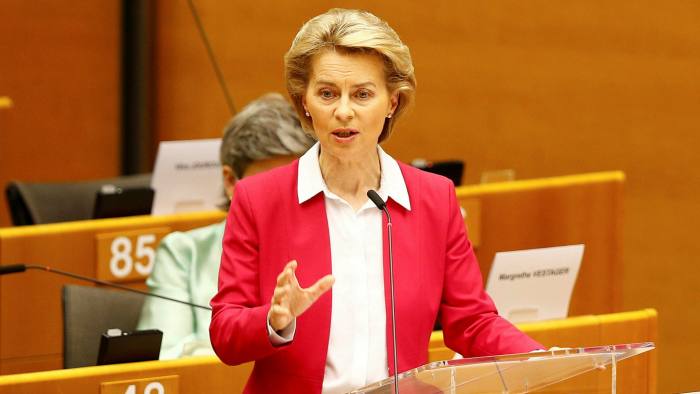
Brussels wants €750bn borrowing power to fund virus recovery
European Commission president Ursula von der Leyen must win backing from reluctant capitals
by Jim Brunsden, Sam FlemingBrussels has called for the power to borrow €750bn to bankroll recovery efforts after the coronavirus crisis, warning that failure to act would leave the EU permanently fractured along economic lines.
European Commission president Ursula von der Leyen is urging a transformation of the EU’s central finances that will allow it to raise unprecedented sums from the capital markets and hand out the bulk of the proceeds as grants to hard-pressed member states.
As previously reported by the Financial Times, the commission chief is also proposing a suite of new EU taxes and levies to pay back the debt over the coming decades — hitting everything from tech giants to carbon emissions — to raise tens of billions of euros a year.
Her plans, presented on Wednesday afternoon, follow a high-profile joint proposal from Germany and France, which last week endorsed a recovery fund of €500bn, all of it to be handed out in grants to hard-hit parts of the EU. The commission’s proposals match that ambition and add €250bn of further borrowing intended to fund loans to member states.
Recommended
ExplainerCoronavirus
How would Ursula von der Leyen’s coronavirus recovery fund work?
Outlining her plans in the European Parliament, Ms von der Leyen warned that the problems Europe faced were too grave to be fixed by any individual member state. “We either all go it alone, leaving countries, regions and people behind, and accepting a union of haves and have-nots, or we walk that road together, take that leap forward, we pave that strong path for our people and the next generation,” she said.
On Wednesday morning Christine Lagarde, European Central Bank president, warned that the eurozone’s economy would shrink by 8 to 12 per cent this year, a recession twice as deep as the one that followed the 2008 financial crisis.
Ms von der Leyen’s proposal, baptised “Next Generation EU”, answers a call from all EU leaders for Brussels to find a way to pump money into the regions that are suffering the most from the havoc wreaked by coronavirus. But the EU faces a formidably complex and politically charged task forging a consensus across the 27 member states as national capitals present rival visions for Europe’s economic reconstruction.
Editor’s note

The Financial Times is making key coronavirus coverage free to read to help everyone stay informed. Find the latest here.
While so-called frugal states in the north are seeking to limit or exclude the use of borrowed money for grants, southern capitals including Rome and Madrid are pushing for the EU to display greater solidarity as they warn that the economic playing field is being tilted in favour of deeper-pocketed states that can afford more generous fiscal stimulus programmes.
EU officials will be focused on reactions from countries including the Netherlands and Austria, which are determined to avoid being placed on the hook for large increases in spending. The distribution of the funds will depend on what states apply for and how their plans are assessed, but a preliminary table seen by the FT shows that Italy, Spain and France would be the leading recipients of grants. Italy could be in line to get close to €82bn.
Brussels anticipates that new taxes and levies could cover all interest and repayment costs. Among those levies are proposals that Brussels taps revenues from reforms to the EU’s carbon market, known as the emissions trading system.
The system, which allows companies to buy and sell permits to emit CO2, could yield about €10bn a year for the EU budget. A mooted levy on carbon-intensive industrial products shipped from outside the bloc could bring in anything from €5bn to €14bn depending on its design.
Recommended
John Springford
The EU recovery fund is a historic step, almost
Alongside its proposals for environmental taxes, the commission is exploring a new levy on large businesses, which could yield about €10bn a year for EU coffers. A tax on big tech companies such as Facebook and Google could generate about €1.3bn a year if it went ahead.
But new funding sources for the EU budget have tended to be highly controversial among national governments, and it is not clear that any of the proposed taxes will win enough political support. Even a more limited proposal to impose a €7bn tax on plastic waste was opposed by a swath of capitals during budget discussions among EU leaders in February.
The EU plan wraps together the recovery fund with the bloc’s next seven-year budget, which is due to run from the start of next year and which has yet to be agreed by EU leaders.